Magnetic Locator vs. Metal Detector

Both a
magnetic locator and a metal detector can be used to find metals, which is something that humanity can’t do without. Metals are used to build everything we use in this Modern Age, and there are two basic types: ferrous and non-ferrous. Ferrous metals contain iron (either in large or small quantities), while non-ferrous metals do not. This the key element that defines the difference between these two tools. Magnetic locators can only be used to find ferrous metals, while metal detectors can find all types of metals.
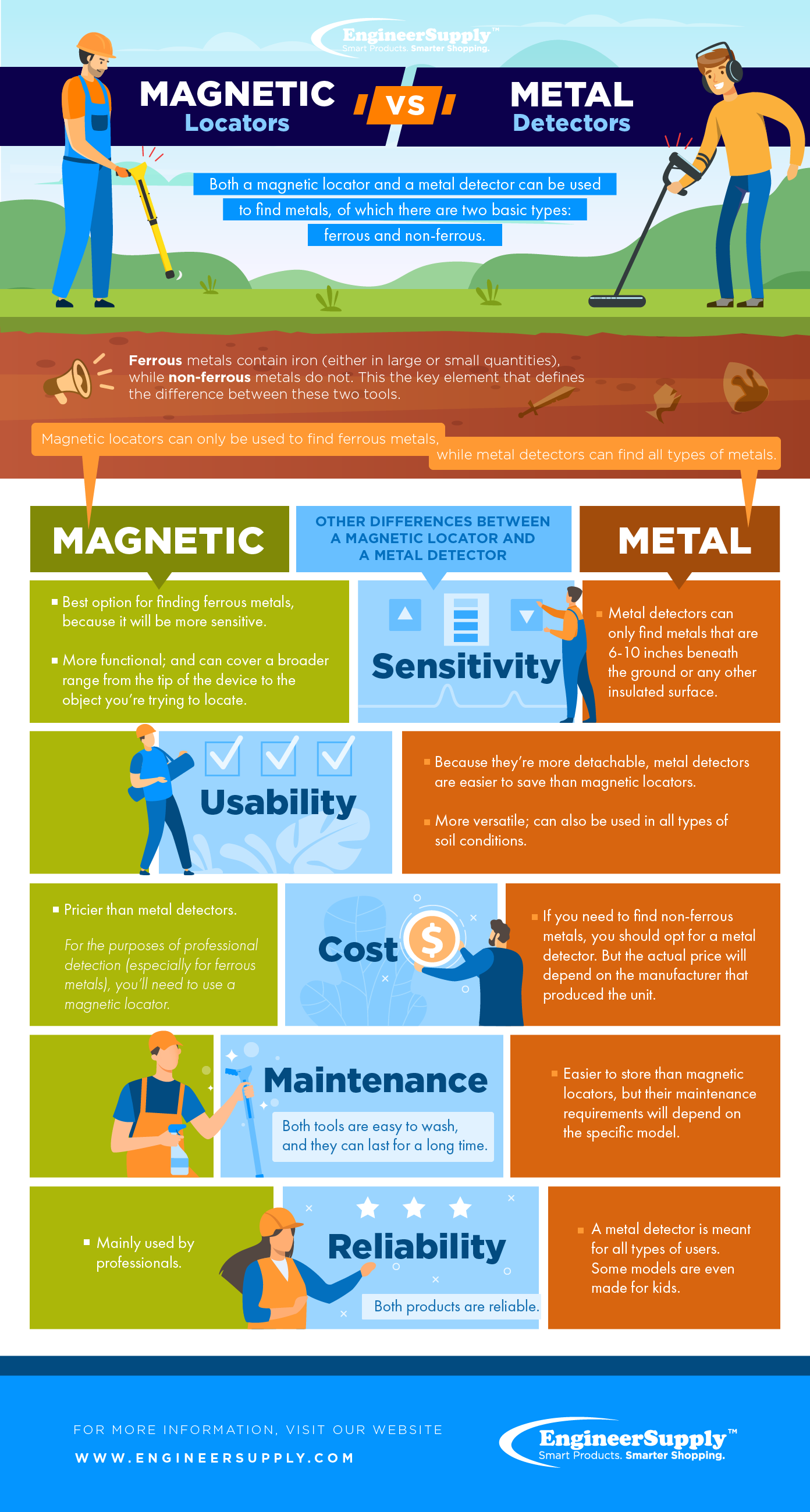
The Main Difference Between a Magnetic Locator and a Metal Detector
Magnetic locators are used to find ferrous metals, and they’re sensitivity doesn’t depend on the size of the object for which you’re searching or on the distance between the insulating materials and the tip of the locator. There are other peculiarities that determine the difference between a
magnetic locator. Metal detectors can give you more options from which you can choose, though it will depend on the product you purchased. A magnetic locator doesn’t have this option.
The sensitivity of a magnetic locator can be adjusted. And like a metal detector, it has a wand you can use to move it from one place to another. It will also make a sound to notify you when it has found a ferrous metal. While the purpose of this tool is to find iron and steel, a
magnetic locator will often be made of non-ferrous metals to increase its longevity. The sensitivity of the sound it produces can be adjusted, but it doesn’t have coils.
A metal detector will often come with the following features:
- It has adjustable and removable rods.
- It has a coil at the tip that allows you to find metals.
- It uses batteries to enhance its performance.
- It makes a sound when a metal has been discovered.
Some metal detectors have screen displays and buttons you can use to determine their functionality, and they will often have a handle you can use to grip the unit’s wand.
Other Differences Between a Magnetic Locator and a Metal Detector
Here are some other differences between a
magnetic locator and a metal detector:
- Sensitivity— If your main goal is to find ferrous metals, a magnetic locator will be your best options because it will be more sensitive. Metal detectors can only find metals that are 6-10 inches beneath the ground or any other insulated surface. Magnetic locators are more functional, and they can cover a broader range from the tip of the device to the object you’re trying to locate.
- Cost— Magnetic locators are pricier than metal detectors. For the purposes of professional detection (especially for ferrous metals), you’ll need to use a magnetic locator. If you need to find non-ferrous metals, you should opt for a metal detector. But the actual price will depend on the manufacturer that produced the unit.
- Usability— Because they’re more detachable, metal detectors are easier to save than magnetic locators. And while they have almost the same functionality, they have different designs. Not only are metal detectors more versatile, but they can also be used in all types of soil conditions.
- Reliability— Both products are reliable. But unlike a magnetic locator (which is mainly used by professionals), a metal detector is meant for all types of users. Some models are even made for kids.
- Maintenance— Both tools are easy to wash, and they can last for a long time. Metal detectors are easier to store than magnetic locators, but their maintenance requirements will depend on the specific model.
If you’re a professional who needs a
magnetic locator for your next project, feel free to look at what we have at Engineer Supply.
How to Buy a Magnetic Locator
A
magnetic locator is used to find ferrous metals underground, underwater, or in snow. But it won’t find any non-ferrous or non-metallic objects (such as PVC pipe). If this is your main purpose, you’ll need to use a pipe locator or some other utility location tool. Before you make a decision on what type of magnetic locator will best fit your needs, there are some things you should consider:
- Price— If you’re concerned about the unit’s price, you should also think about its life expectancy. Some magnetic locators can be used for 20 or 30 years by some surveyors, while others can use the same one for their entire career. Think about how that price will be spread out over these years instead of the money you’ll have to spend up front.
- Warranty— Magnetic locators will often come with a warranty, which will vary with each manufacturer. Dunham & Morrow magnetic locators come with a Lifetime Warranty, while Schondstedt’s warranties will vary from model to model. The GA-52Cx has a 7-year warranty, while the GA-72Cd comes with a 5-year warranty. The CST Magna-Trak also comes with a 5-year warranty.
- Headphones— Using headphones while operating any type of utility locator is considered dangerous, because you won’t be able to hear other sounds at a construction site or around highways. That’s why this type of operation isn’t recommended. If you do use them, you should take these factors into careful consideration.
- Cases— Some people like a soft case better than a hard one. But if you do want a case, you should think about what type you want. Some of them even have shoulder straps that make it easier to carry while you’re out on the field.
- Options and Size— Some people need a tool that’s easy to carry, while others need some optional accessories that allow you to do a few more tasks than other magnetic locators. It all depends on what you want to do and where you plan to use it.
If you’re looking for one of the best places to purchase a
magnetic locator, be sure to look at what we have at Engineer Supply.

Frequently Asked Questions
How far can a magnetic locator find objects underground?
The range of a
magnetic locator will depend on the size, orientation, and mass of the object it needs to detect. It can find a 55-gallon drum at 15 feet deep, but most people who use this type of utility locator are searching for property corners (also called “pins”) that are made of rebar and pipe. They may also need to find cast-iron valve and meter boxes, as well as ductile iron water pipes and underground storage boxes.
Does a pipe locator work on plastic pipes?
Because it’s a non-conductive material, plastic can’t be found in the same way as iron or steel. Even copper can be found fairly easily with a pipe locator. You can find plastic pipes more easily by using the following techniques:
- Tracer Wire— This technique has been used for quite some time, so it’s one of the more traditional ways to use this type of utility locator. Tracer wire is specifically designed for underground use and is made of copper-clad steel, which makes it less prone to breakage.
- Detectable Tape— This type of tape comes in rolls of about two inches wide, and it has a backing made of aluminum foil that can be detected. A locator signal can also be sent through the end of the tap or by induction through a transmitter on the ground above the tape with a standard pipe locator, but it’s not as precise as a tracer wire system.
- Fiberglass Probes— It has a copper wire core that can have a signal sent from a transmitter, which is similar to the tracer wire method. This location technique is practical for utility lines that are active or taken out of service, but it’s not suitable for larger water mains (unless it has been temporarily taken out of service).
- Acoustic Pipe Locating— Plastic pipes can often be located when they’re leaking by using leak noise locators. Most people who use this technique can find a pipe by the sound of the leak, which will peak when the locator is directly over the leaking pipe.
If you’re looking for any type of
utility locator you can use at a job site, be sure to look at what we have at Engineer Supply.
Can a magnetic locator find coins, brass, and other metallic objects?
Magnetic locators can only find objects that are made of ferrous metals. So if a magnet will stick to it, they can find it. If it’s made of brass, copper, or some other non-ferrous metal, you will not be able to use this tool.
What's the ideal frequency for a pipe locator?
Finding a frequency for your
utility locator that will give you the clearest signal will depend on many factors. Different frequencies may behave differently, depending on the conductivity of the line and on the different ground conditions. The properties of each utility line (or circuit) and even the surrounding soil can positively or negatively affect the flow of the current, so the frequency selection for one job may not be the ideal choice for another.
Where can I buy a quality magnetic locator?
If you’re looking for a
magnetic locator or any other utility location device you can use on your next job, Engineer Supply has a broad selection from some the best manufacturers in the industry. Feel free to look at what we have in stock, so you can find a tool that will meet your specific needs.
Best Magnetic Locators
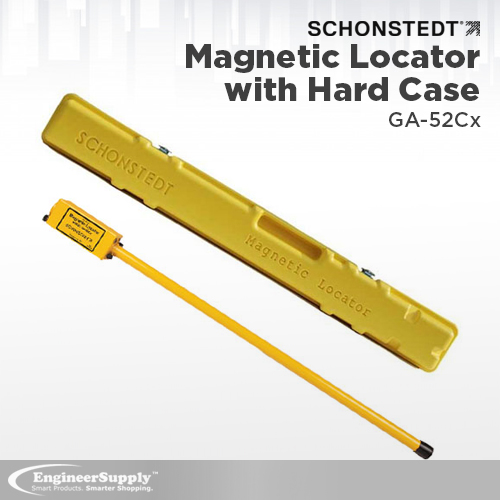
The GA-52Cx from Schonstedt is one of the most rugged and dependable locators you can buy. It provides five levels of sensitivity to ensure that you find what you are looking for without passing over it. There are only two controls on the body, making it easy to use with one hand. It also makes it more dependable. If you will be doing a lot of surveying, this should be a serious contender on your list.
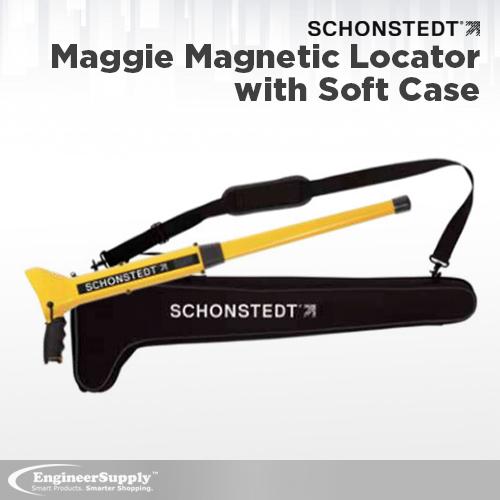
The Maggie is an opportunity to get the best of two worlds. It features the sensitivity of the GA-52Cx and the one-handed design of the GA-92XT, Schonstedt’s two flagship models. It has an LCD screen with a bar graph showing polarity. It is rated IP54 for dust and water resistance. The modular construction and durable design help make this another top choice from Schonstedt.
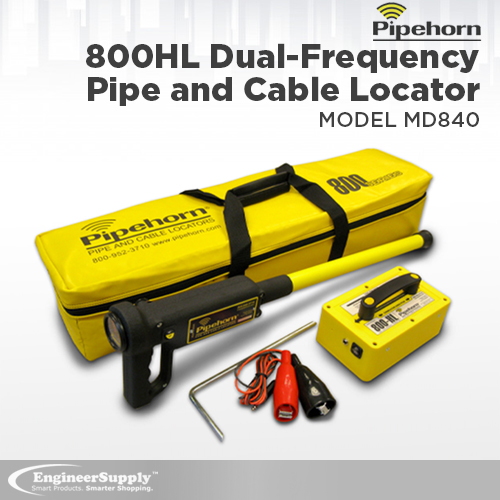
The 800HL from Pipehorn is a capable pipe locator. It has two frequencies: 480 kHz and 9kHz. This makes it easier to locate utilities in both congested areas and at a distance. Users can change between frequencies with a single switch flick. It has a handle for easy one-handed use. This can be used for coated pipes, un-energized power lines, fiber, concentric neutral and many other utilities.
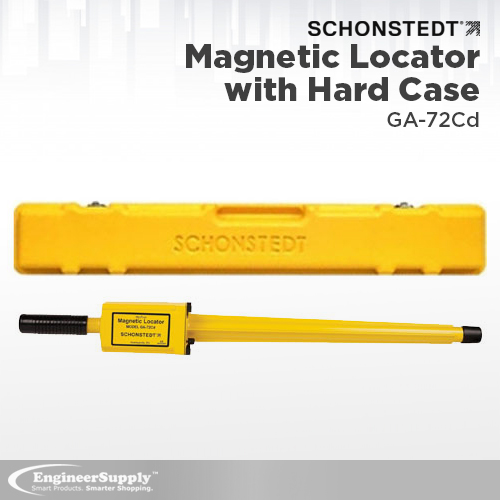
The GA-72Cd is the most popular choice for UXO and demining applications. It is the brand’s most versatile locator for magnetic fields. Like many other Schonstedt products, it has a very simple set of controls to make it as easy to use as possible. It features a screen showing a polarity graph, gain level and battery status.
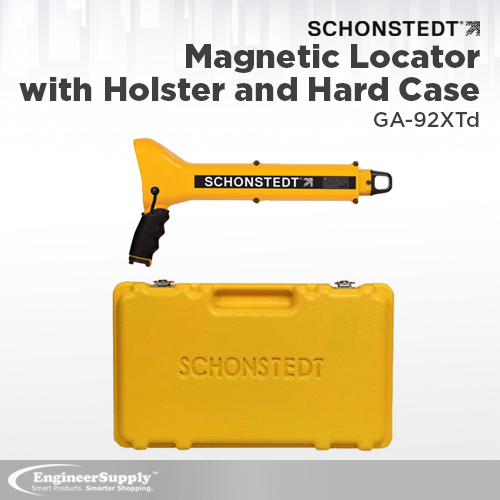
This ultra-compact locator is Schonstedt’s most portable product. It telescopes so that it can be easily transported in a small package. Additionally, it features a special handle that makes it easy to operate with one hand, pressing the buttons with your thumb. This is an especially good choice for anyone who has to travel a lot for work.
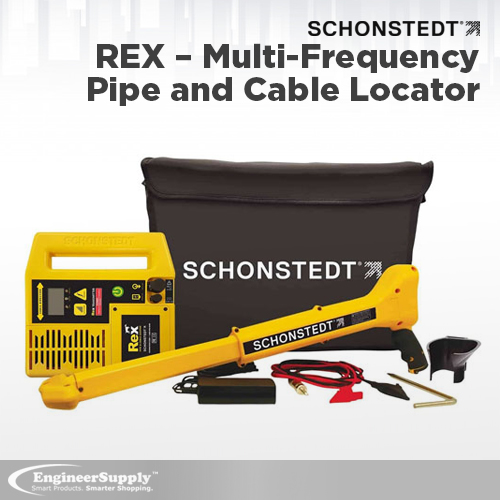
This pipe locator from Schonstedt is a top-of-the-line tool. It has three frequencies (512 Hz, 33 Hz and 82 kHz) as well as 50/60 Hz passive and 512 Hz sonde detection. Plus, the transmitter is only four pounds, and the receiver is only three. This is a very compact and lightweight tool. Like many other Schonstedt models, the REX is IP54 rated for dust and water resistance.
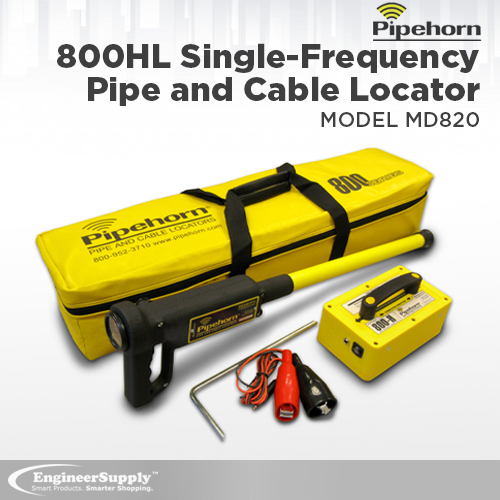
The Pipehorn 800H is a lot like the 800HL described above. However, it uses a single frequency of 480 kHz. It can work down to a depth of 18 feet. The strong ABS housing and watertight construction help make this a very durable tool for use in the field.
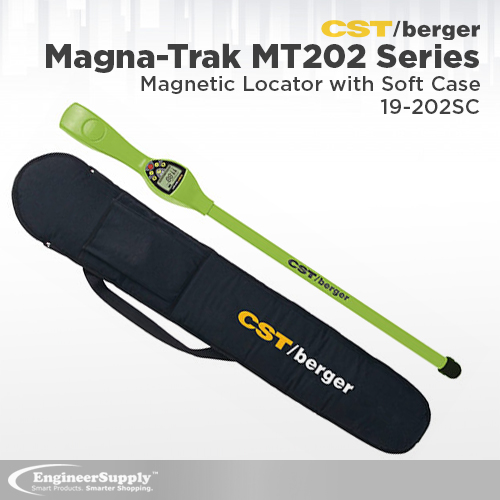
The MT202 series locator is a high-quality device with strong construction and a large LCD screen for easy operation. The digital bar graph readout makes it easier than ever to locate items. Plus, the MT202 has the ability to block out a source of magnetic interference (for example, a nearby fence). It can locate larger objects at a depth of up to 15 feet.
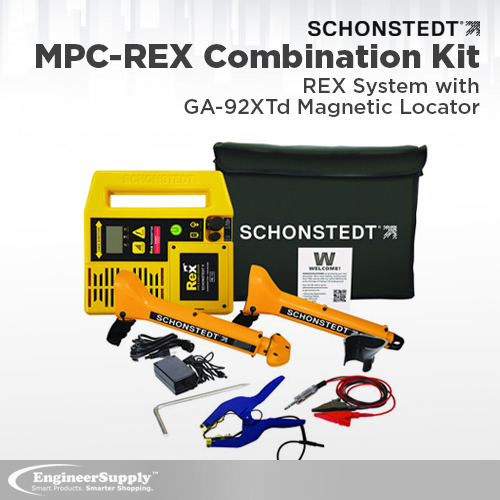
If you need to locate both utilities and magnetic fields, this combination set is a great choice. It features the compact but powerful REX and the highly-effective and portable GA-92XTd. The entire package can fit into a custom shoulder bag. Both locators are described above.
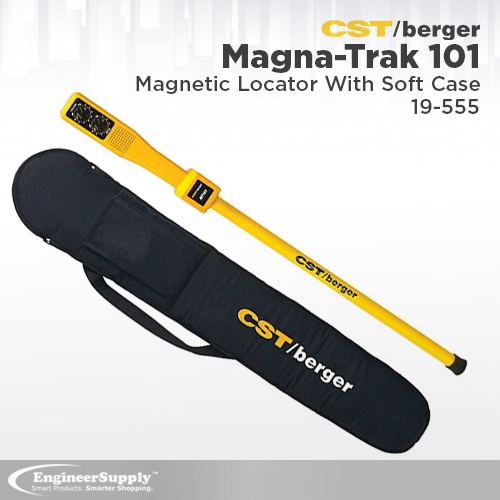
This no-nonsense locator is an effective and reliable tool for finding ferrous objects underground. The Magna-Trak 101 has easy-to-use control knobs for adjusting sensitivity and volume. With a strong but lightweight aluminum tube and strong sensors, this is a magnetic locator you can always rely on when you need it.